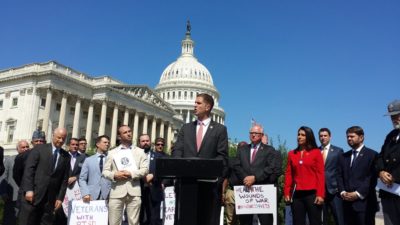A local military veteran turned lawyer received good news from the Supreme Court this week in his two year long crusade to help end “bad paper” discharges for U.S. Military veterans. Tyson Manker received a less than honorable discharge from the Marine Corps several years ago because he was caught smoking marijuana to calm his nerves after years of strenuous combat in the Middle East.
Manker has told various media outlets about a one-page questionnaire he filled out upon returning from deployment to screen for Post-Traumatic Stress Disorder. Manker recalled to the New York Times back in 2018 that he had marked exposure to every type of trauma listed on the questionnaire including seeing dead civilians and Marines, killing enemy fighters and civilians, and experiencing nightmares and hyper-vigilance. Manker said he never received follow up from the Marine Corps about it. When he returned to the United States, Manker said he smoked marijuana to calm his nerves and was caught and then dishonorably discharged. After the discharge, Manker went through personal hardship before finally being able to get private treatment and was diagnosed with PTSD by two civilian therapists. Eventually, Manker was able to get private treatment and go on to law school. Manker submitted a heavily nuanced petition to the Board of Corrections of Naval Records in 2016 but was denied an upgrade for his own record again. The letter he received from the board said that PTSD had not influenced his decision to smoke marijuana and that he made a conscious decision to violate the tenets of his service.
In the years since his discharge and subsequent attempts to upgrade it, Manker has worked as an attorney both locally in Washington D.C. advocating for upgrades to honorable discharges for veterans who have been rejected due to PTSD and traumatic brain injury-related issues they experienced. He has also fought for the arrangement and application of local veterans courts at all the county courts in the area, something he says that needs to be done to follow the law. He feels like local officials and lawmakers have not done enough in getting the veterans courts running properly or at all. Manker campaigned on the issue when he ran for State’s Attorney in 2016 in Morgan County.
A group of Yale Law School students filed a class-action federal lawsuit in March of 2018 on behalf of Manker and others who have experienced institutional bias towards veterans who suffer from PTSD. This past week, prior to Veteran’s Day, Manker’s suit received a major victory in federal court. “Last week, the court ruled on the government’s motion to dismiss, “Manker explained, “The government tried to argue a number of reasons why the court didn’t have jurisdiction to the decide the case, and all of those were insufficient. The court ruled that all of the allegations that we have made has merit. Everything that we have alleged is now a matter of law. Moving forward we are going to produce evidence from the discharge review board that will help the court inform its opinion when it makes a final ruling. What we hope for in that final ruling is that the Navy and Marine Corps has broken the law and now you need to make things right with the half a million veterans who have been effected.”
Manker’s lawsuit alleges that the 85% denial rate for the upgrade requests by the Naval Discharge Review Board is having a significant impact on over half a million veterans who return home with invisible wounds. “When troops return from combat, they are often not screened for medical issues as required by law. As a result over the years, we have seen tens and hundreds of thousands of troops sent home with undiagnosed traumatic brain injuries, post traumatic stress, and even those who are suffering from military sexual trauma. What we are trying to do is force the government to follow the law and correct records for these half a million veterans who have served their country.”
Manker’s case is not unique. He says that several veterans have been denied honorable discharges, like himself, because of minor instances away from the battlefield or minor misconduct near the end of their service. The “bad paper” discharges have left several veterans ineligible for benefits that are crucial to helping veterans who have experienced trauma to rebuild their lives. Manker says its time to correct past mistakes and help everyone move forward with the help they deserve and desperately need. “What I want to see come from this is service members who are injured while they are serving should not be punished for those injuries, and now we are in the position to kind of correct things that have happened in the past. For any individuals who are effected by this, we want them to have a simple, straightforward process of applying to get their records corrected whatever shape or form that takes. On one end of the spectrum we could have an order of the court that orders the Navy and Marine Corps to upgrade discharges. Now that is a best case scenario. I’m expecting more of a rule to come from the case that subsequent applicants can go to the board and use the ruling when they ask for their honorable discharge.”
In a recent op-ed on The Nation, Manker called on national leaders to take executive action on behalf of the bad paper veterans to come to a permanent codified solution to what he feels is a national security problem.




